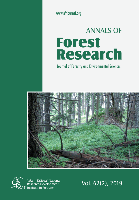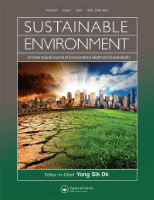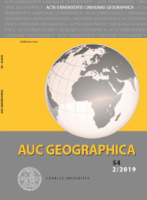
Catrina-The International Journal of Environmental Sciences
Scope & Guideline
Connecting Scholars to Tackle Today’s Environmental Issues
Introduction
Aims and Scopes
- Environmental Stress Responses in Plants:
Research on how plants respond to environmental stressors, such as drought and salinity, using experimental approaches to enhance plant resilience and productivity. - Ecological and Biochemical Studies:
Investigations into the ecological dynamics and biochemical properties of various species, including the assessment of antimicrobial properties of plant extracts and the effects of pollutants. - Remote Sensing and Geographic Information Systems (GIS) Applications:
Utilization of remote sensing and GIS technologies to monitor environmental changes, assess coastal dynamics, and support sustainable urban planning. - Sustainable Practices and Biotechnological Innovations:
Focus on sustainable agricultural practices, including the use of biocontrol agents, biodegradable materials, and eco-friendly production methods. - Health and Environmental Toxicology:
Research addressing the impacts of environmental toxins on health, including studies on food safety, pollution, and the effects of chemicals on living organisms.
Trending and Emerging
- Climate Change Mitigation and Adaptation Strategies:
Increased focus on research that connects climate change with biodiversity loss and explores strategies for adaptation and mitigation, highlighting the interconnectedness of these issues. - Nanotechnology and Biocompatible Materials:
Emerging studies on the use of nanotechnology, particularly in environmental applications and materials science, are gaining traction, showcasing innovative solutions to environmental problems. - Health Impacts of Environmental Factors:
Growing attention to the health implications of environmental pollutants, including studies on antimicrobial resistance and the effects of dietary factors on health, underscores the importance of environmental health. - Restoration Ecology and Revegetation Projects:
Research on the restoration of degraded ecosystems and large-scale revegetation projects is increasingly emphasized, reflecting a commitment to ecological rehabilitation and sustainability. - Biological Control and Eco-friendly Pest Management:
A rising trend in exploring biological control measures and eco-friendly pest management strategies highlights a shift towards sustainable agricultural practices that minimize chemical use.
Declining or Waning
- Traditional Agricultural Practices:
Research focusing on conventional agricultural methods has become less prominent, possibly due to the rising interest in sustainable and eco-friendly agricultural practices. - General Biodiversity Studies:
While biodiversity remains a core area, specific studies on general biodiversity without a focused ecological or conservation angle have seen a decline, reflecting a more targeted approach in recent research. - Pollution Studies Without Innovative Solutions:
Papers discussing pollution solely from a descriptive standpoint, without proposing innovative management or remediation solutions, have become less common as the journal emphasizes actionable research.
Similar Journals

JOURNAL OF THE NATIONAL SCIENCE FOUNDATION OF SRI LANKA
Exploring the Frontiers of Scientific ResearchJOURNAL OF THE NATIONAL SCIENCE FOUNDATION OF SRI LANKA, with ISSN 1391-4588 and E-ISSN 2362-0161, is a respected academic publication disseminated by the National Science Foundation of Sri Lanka. Operating since 1999, this journal encompasses a broad spectrum of multidisciplinary research, currently positioned in the Q3 category and ranking #101 out of 171 in its field, indicating its significant contribution to advancing knowledge across various scientific domains. With an ambition to foster local and international scholarly dialogue, the journal encourages submissions that address fundamental and applied aspects of science pertinent to Sri Lanka and beyond. Though it operates under a conventional access model, the journal is committed to promoting high-quality, peer-reviewed articles that are vital for researchers, professionals, and students aiming to stay at the forefront of scientific advancements in the region.

Indian Journal of Geo-Marine Sciences
Unveiling the Secrets of Oceanography and GeosciencesThe Indian Journal of Geo-Marine Sciences, published by the NATIONAL INSTITUTE OF SCIENCE COMMUNICATION & INFORMATICS (NISCAIR), serves as a vital platform dedicated to the dissemination and advancement of knowledge in the field of marine and geosciences. As an open-access journal, it allows for improved visibility and accessibility of research findings to a global audience, enabling researchers, professionals, and students to share insights into oceanography and related disciplines. With a publication history spanning from 2007 to 2010 and continuing from 2012 to 2024, it has established itself within the academic community as a reliable source of innovative research, despite being classified in Q4 of Oceanography and holding a Scopus rank that places it in the 27th percentile. This journal is particularly relevant for those investigating marine ecosystems, geological oceanography, and their interconnections, thus playing an essential role in fostering understanding and communication within this important area of scientific inquiry.

International Journal of Ecological Economics & Statistics
Empowering Economists with Ecological Perspectives.The International Journal of Ecological Economics & Statistics is a critical platform for research in the intersecting fields of ecological economics and statistical analysis. Published by the CENTRE ENVIRONMENT SOCIAL & ECONOMIC RESEARCH (PUBL-CESER), this journal aims to promote scholarly discussion and knowledge dissemination regarding sustainable economic practices and quantitative research methodologies. Despite the discontinuation of its coverage in Scopus, the journal continues to play a significant role in enhancing the understanding of the economic aspects of environmental issues within a global context. Researchers and professionals engaged in the fields of economics, decision sciences, and environmental studies are particularly invited to contribute and stay updated with the latest findings and theories. With its commitment to fostering academic discourse, the journal aspires to bridge the gap between environmental sustainability and economic growth, equipping readers with essential insights for future applications.

CienciaUat
Fostering interdisciplinary insights for a brighter tomorrow.CienciaUat is a distinguished academic journal published by the Universidad Autónoma de Tamaulipas, dedicated to fostering innovative research across various scientific disciplines. With an ISSN of 2007-7521 and an E-ISSN of 2007-7858, this journal serves as a platform for the dissemination of high-quality research findings that contribute to the advancement of science and technology within both local and international contexts. The journal aims to promote scholarly communication among researchers, professionals, and students, emphasizing the importance of empirical evidence and interdisciplinary approaches. Though specific metrics like H-Index and Scopus rankings are currently not provided, CienciaUat is committed to maintaining rigorous peer-review standards. The journal’s open-access model facilitates wide accessibility, ensuring that pivotal research reaches a global audience. The editorial team encourages submissions that adhere to the highest academic standards, reflecting innovation and relevance in today’s scientific landscape.

EARTH is a prestigious journal published by MDPI, located in Switzerland, with a commitment to advancing the fields of Earth and Planetary Sciences and Environmental Science. Launched in 2020, the journal emphasizes an open-access publication model, ensuring that high-quality research is widely accessible to the scientific community and beyond. As of 2023, it proudly holds a Q2 ranking in both the Environmental Science and Earth and Planetary Sciences categories, indicating its significant impact within these disciplines; it ranks #90 out of 219 and #70 out of 159 in their respective fields according to Scopus. With the convergence of multidisciplinary research and the critical challenges our planet faces, EARTH seeks to publish innovative studies that foster a deeper understanding of geological and environmental processes. Researchers, professionals, and students alike will find this journal an invaluable resource for the latest findings and discussions shaping our understanding of Earth sciences.

Annals of Forest Research
Empowering knowledge in forestry and plant sciences.Annals of Forest Research is a peer-reviewed journal dedicated to advancing knowledge in the fields of forestry, ecology, and plant sciences. Published by EDITURA SILVICA in Romania, this journal has been an open access publication since 2008, providing a platform for researchers to share their insights and findings with a global audience. The journal operates under a rigorous selection process, reflected in its positioning within the Q2 category in Forestry and Q3 in both Ecology and Plant Science as of 2023. With Scopus rankings indicating a solid percentile among its peers, Annals of Forest Research continues to play a vital role in disseminating innovative research and fostering scholarly dialogue. Researchers, professionals, and students are encouraged to explore its diverse range of articles, which address both foundational and contemporary issues in forest management and environmental sustainability, contributing to the sustainable use and preservation of forest ecosystems.

GLOBAL JOURNAL OF ENVIRONMENTAL SCIENCE AND MANAGEMENT-GJESM
Exploring the intersections of science, management, and sustainability.Global Journal of Environmental Science and Management (GJESM), published under the distinguished leadership of Professor J. Nouri, is an esteemed academic platform dedicated to advancing the interdisciplinary discourse surrounding environmental science and management. With an ISSN of 2383-3572 and an E-ISSN of 2383-3866, GJESM has established itself as a prominent Open Access journal since 2014, allowing for unrestricted sharing of knowledge and research findings. Based in Iran, this journal caters to a diverse global audience, featuring contributions that span various critical domains including agricultural and biological sciences, environmental engineering, pollution management, and social sciences, evidenced by its impressive 2023 Q1 and Q2 quartile rankings across multiple categories. The journal’s Scopus rankings demonstrate a robust standing in the academic landscape, with exciting placements that underscore its relevance in key fields. By bridging the gap between scientific inquiry and practical application, GJESM serves as a vital resource for researchers, practitioners, and students seeking to understand and address the pressing environmental challenges faced by our planet today.

Sustainable Environment
Fostering interdisciplinary dialogue for a sustainable future.Sustainable Environment, published by Taylor & Francis Ltd, is a pioneering journal dedicated to advancing the field of sustainability studies. Since its inception in 2021, this open-access journal has sought to provide a platform for multidisciplinary research that addresses pressing environmental challenges and sustainable practices. With a commitment to disseminating high-quality research swiftly, Sustainable Environment aims to engage researchers, policymakers, and practitioners across various domains, fostering scholarly dialogue and innovation. The journal covers a broad range of topics, including climate change, resource management, and sustainable development, making it a vital resource for anyone looking to contribute to and understand contemporary environmental issues. With its flexible access options, readers from all backgrounds can benefit from the latest insights and findings in sustainability research, thereby promoting a more sustainable future.

AUC Geographica
Fostering Innovative Research in Earth and Environmental StudiesWelcome to AUC Geographica, a distinguished journal published by CHARLES UNIV PRAGUE, KAROLINUM PRESS, focusing on the expansive and interdisciplinary fields of Earth and Planetary Sciences, as well as Geography, Planning, and Development. With an ISSN of 0300-5402 and an E-ISSN of 2336-1980, this Open Access journal has been freely accessible since 2010, allowing researchers, professionals, and students to engage with high-quality scholarly articles without barriers. As of 2023, it holds a Q4 ranking in its respective categories, reflecting its commitment to contributing to the academic discourse despite competitive landscapes. Located in Prague, Czech Republic, at OVOCNY TRH 3/5, PRAGUE 1 116 36, AUC Geographica aims to foster collaboration and innovative research in the multifaceted relationships between human activities and the natural environment. With a publication history spanning from 1975 to 2024, this journal continues to be a vital resource for those seeking to advance knowledge and explore new dimensions in geography and Earth sciences.

Carpathian Journal of Earth and Environmental Sciences
Connecting Knowledge for a Greener TomorrowCarpathian Journal of Earth and Environmental Sciences is a distinguished academic journal dedicated to advancing the interdisciplinary field of Earth and environmental sciences. Published by the Carpathian Association for Environment and Earth Sciences, this journal plays a pivotal role in disseminating high-quality research focused on the dynamic interactions between geological processes and environmental changes. With an ISSN of 1842-4090 and an E-ISSN of 1844-489X, the journal is indexed in Scopus and holds an esteemed Q3 quartile ranking in both Earth and Planetary Sciences and Environmental Science categories as of 2023. Since its inception in 2008, the Carpathian Journal has provided an open access platform for researchers, professionals, and students to share insights, foster collaboration, and engage in critical discussions on pressing environmental issues. By continuously contributing to the body of knowledge in this field, the journal not only enhances academic discourse but also promotes sustainable environmental practices across Romania and beyond.